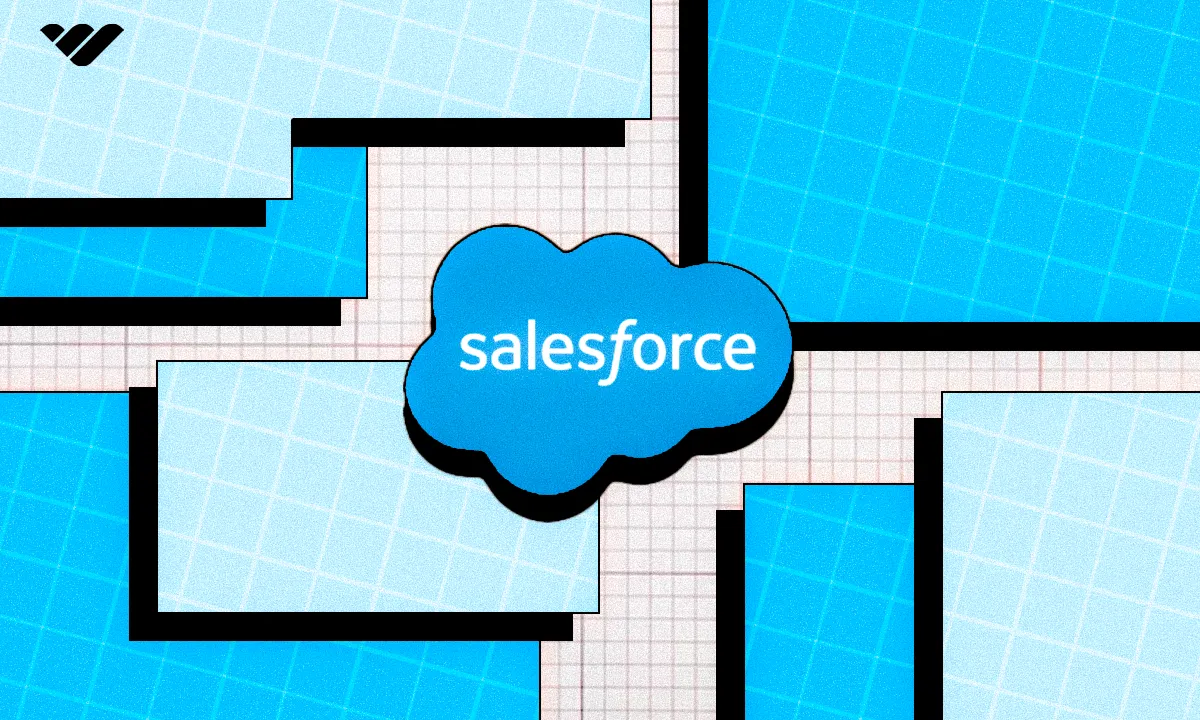If you're searching for a customer relationship management (CRM) system, you'll likely have heard of Salesforce. But is it the right choice for your business? Read on to find out how it compares to other options.
Key takeaways
- Salesforce offers powerful customization and 1,000+ integrations, but requires a complex setup process to get started.
- With no free plan and prices from $25-$500 monthly (billed annually), Salesforce is costlier than most CRM alternatives.
- Best suited for businesses prioritizing flexibility over simplicity, as the platform molds to your workflow rather than forcing adaptation.
When you’re running a business, you acquire a lot of data. Whether it’s customer records, information on potential leads, or sales statistics, it can be hard to keep on top of it all.
That’s where customer relationship management (CRM) systems come in. They offer you an all-in-one hub in which you can place every aspect of your business, ensuring no important information gets lost.
In this article, we’ll review one of the leading CRM platforms, Salesforce, giving you an insight into its positive and negative aspects, its best features, and its alternatives.
What is Salesforce?

Salesforce is a CRM system, designed to make it easier for companies to find clients, close deals, and develop connections with customers. The platform aims to streamline tasks that used to be time-consuming – such as customer data automation.
It has experienced phenomenal growth since its inception in 1999, and it is now believed to be worth upwards of $153 billion. The company has also evolved considerably throughout its time in business, a theme set to continue as it begins to integrate artificial intelligence.
What is a CRM?
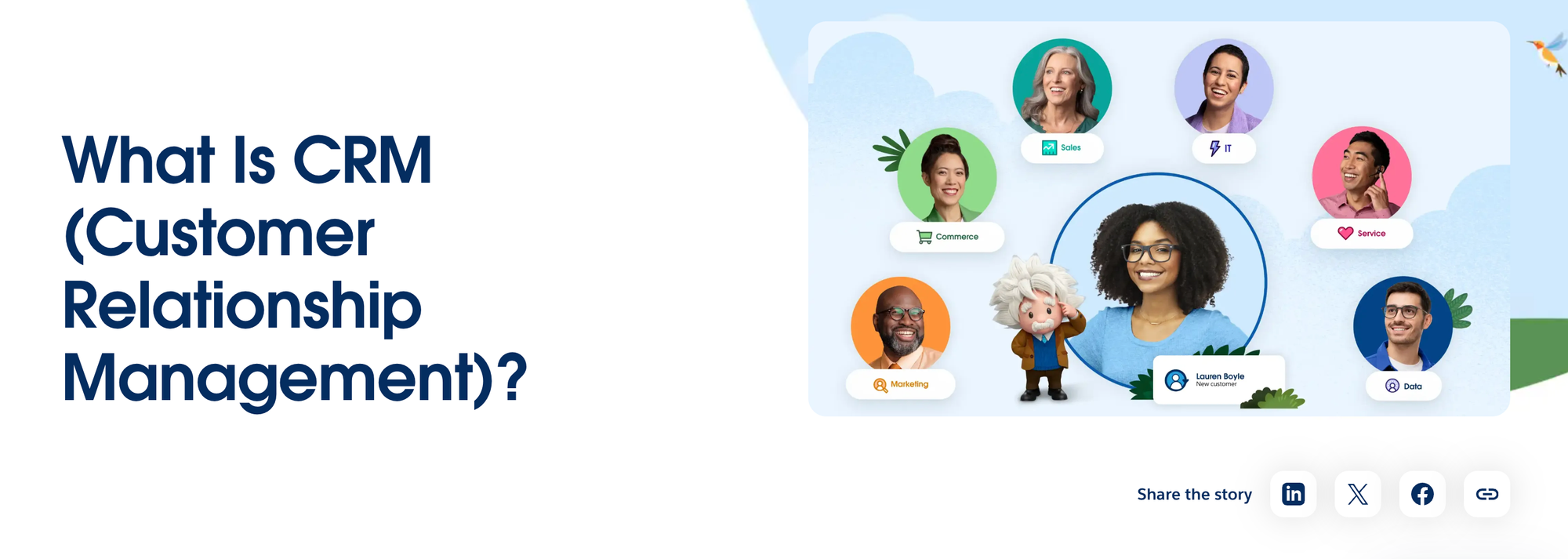
Customer relationship management, known as CRM, is a system that manages your business dealings with potential and current customers. This covers a lot of bases, so let’s break down exactly how a CRM will help your business.
Customer profiles: CRM will give you a clear profile of your customers, logging every purchase they’ve made, order statuses, and any customer service issues they’ve had. Having all this information in one place will ensure each of your employees has the details they need when responding to a customer’s query.
Connecting your employees: CRM acts as a hub within the business on which information about customers, potential leads, and sales campaigns can be shared. CRM gives employees from various departments access to this information, meaning they won’t have to go looking for it in files or old notes.
Retaining information: Before CRM systems were widespread in businesses, a lot of information about customers and leads would be at risk of being lost. This could be because of an employee leaving and taking their information with them, or because of a disorganized filing system.
Increasing productivity: When an employee has all the information they need in front of them, they can get on with their job without a hitch. If they have to go through five different people just to get a single scrap of information, this will slow down productivity.
As you can tell, CRM systems are a must-have in modern businesses, helping companies stay on top of the data and information they collect. This will help interactions between employees and the customers they serve run smoothly, ensuring good work gets done.
Who is Salesforce for?
Salesforce can be used by businesses of all sizes, with its variety of features covering a wide range of needs. For example, large businesses with multiple departments will appreciate the information-sharing features, while smaller businesses can make use of the way it lightens workloads.
The platform will benefit any business that communicates directly with customers, whether it be B2B (business to business) or B2C (business to customer).
How Salesforce works: A full walkthrough of the CRM platform
One of Salesforce’s biggest strengths is that it molds itself around the way you work, rather than forcing your business to adapt to the platform. Naturally, this will make the setup process lengthy and somewhat complicated, but once you’re up and running, your team will be able to operate efficiently.
The Salesforce home screen
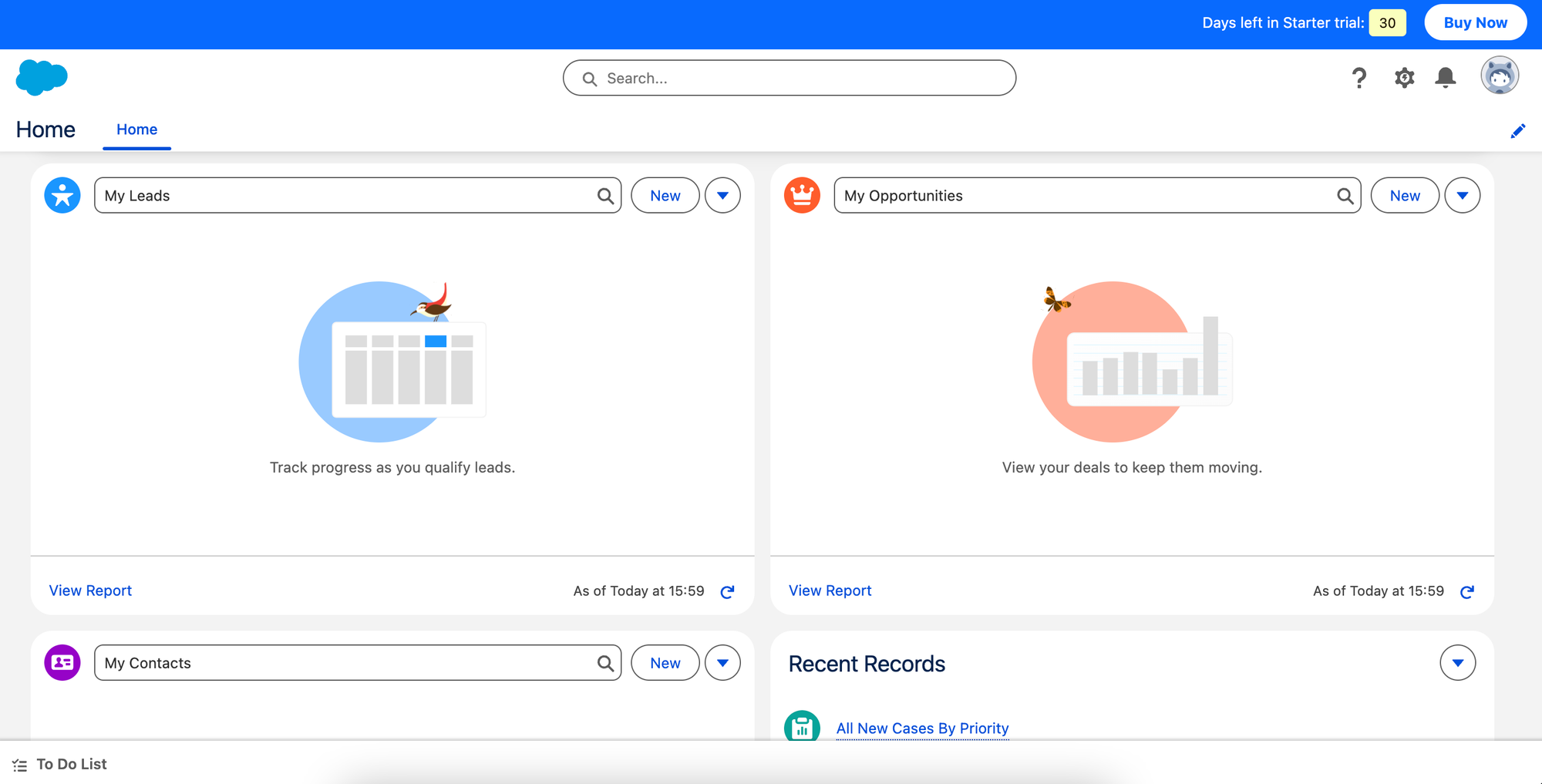
As soon as you log in to Salesforce, you’ll notice how clean and tidy the user interface is. Every aspect of it is clearly named, with options to rearrange sections should you wish to do so.
This is undoubtedly one of Salesforce’s strong points, as employees will be able to clearly understand the system they are working with. This will reduce the time it takes to train staff, saving you time and effort.
Contacts on Salesforce
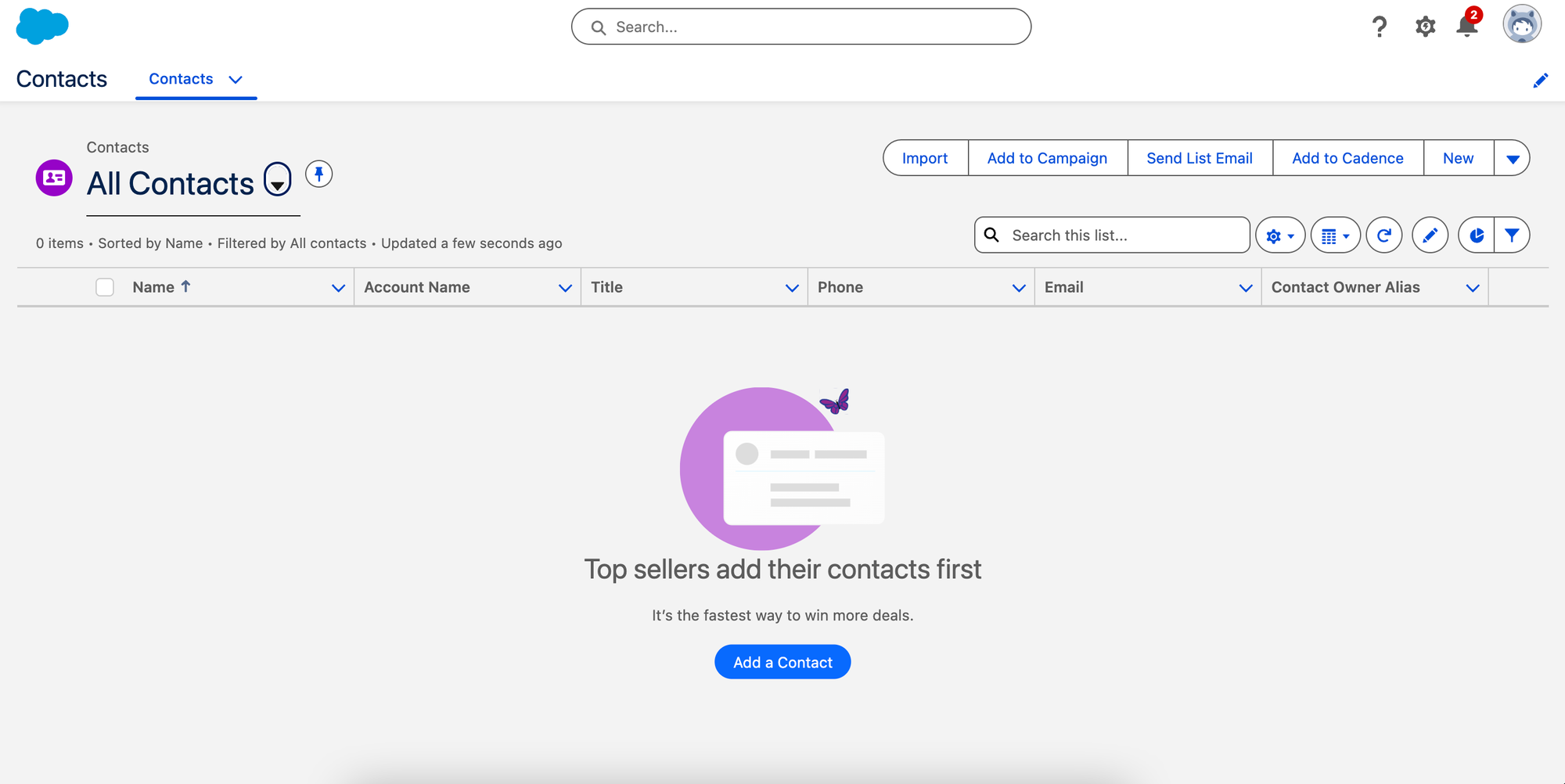
Logging contacts is one of the most important aspects of retaining and earning new customers, which is why Salesforce attaches such importance to it. The contacts section allows you to create email lists, add relevant people to marketing campaigns, and filter specific contacts based on their information.
Naturally, this will help you to nurture relationships with customers, as they won’t be bombarded by marketing campaigns that may not be relevant to them.
Managing your leads
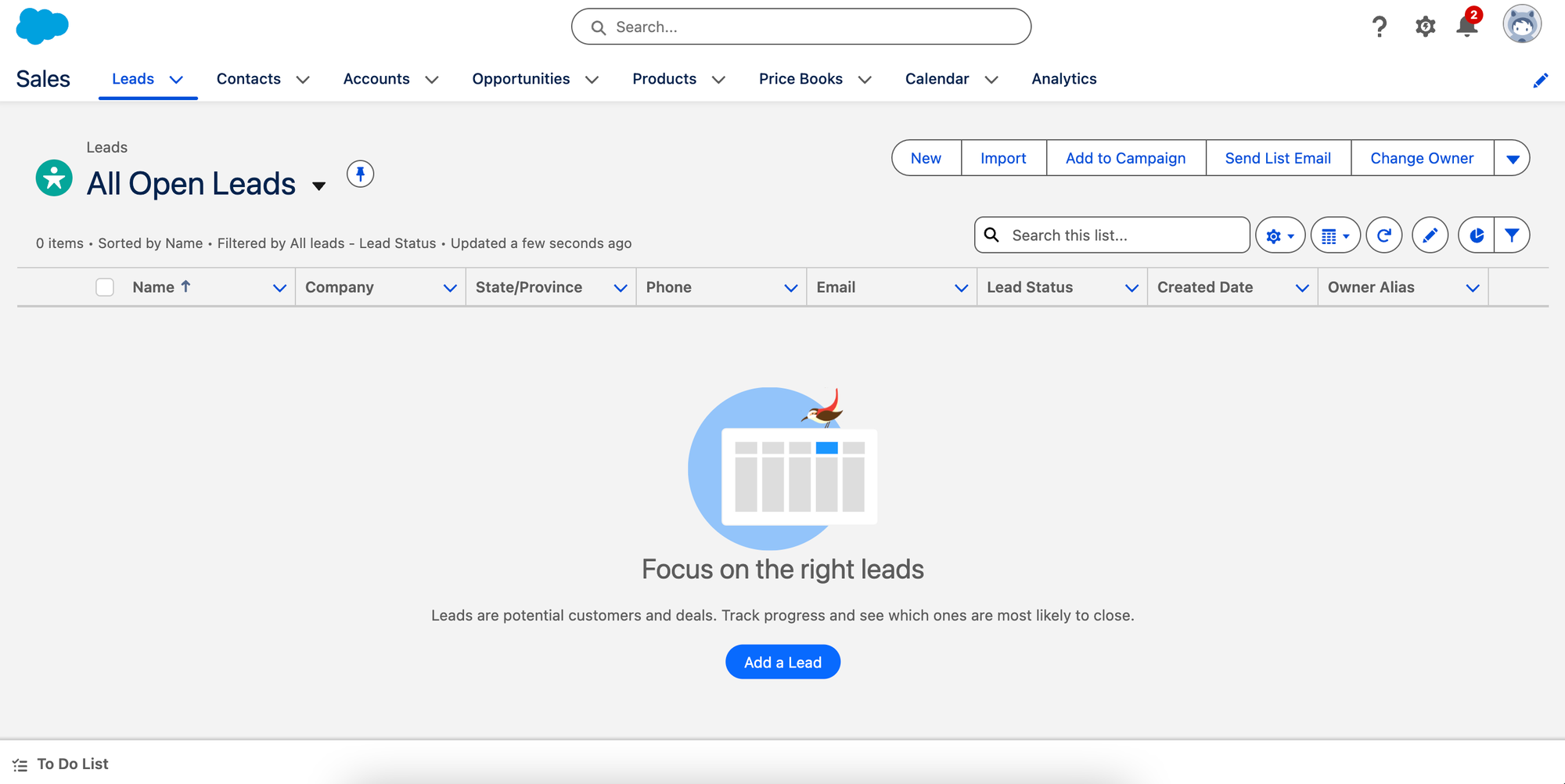
Another important section of the platform is the leads area. It shows you the leads you currently have open, keeping all prospective but not active buyers in one area. This will hopefully result in added sales, as it’s far easier to close a sale when you have the buyer’s information to hand.
Marketing campaigns

Salesforce makes it easy to keep on top of your marketing campaigns and their effectiveness. Staff from different areas, such as the design team, can insert the content they have made into the marketing section, giving other departments access.
This means that multiple departments can work on a single advertising campaign with greater speed and efficiency. You can also schedule emails to send to mailing lists from this section, as well as import contacts from your contacts section.
Commerce

Ultimately, the most important part of business is generating money, which Salesforce makes simple. It has features that enable you to be paid quickly, as well as features that help you to scale up and reach more customers.
In terms of general content, Salesforce is simple to navigate and filled with features that help you stay on top of the information you collect.
But what else does it offer?
What unique features does Salesforce have?
While Salesforce has all the things you would expect from a CRM, it also contains some more distinctive features that will help you work efficiently.
Branded email templates
With Salesforce, you can streamline emails with branded templates. These can be used when sending out emails to customers and between colleagues, saving you from typing out every message individually, as well as nullifying the risk of typos and errors.
Mobile compatibility
Salesforce’s mobile app will allow you and your colleagues to stay connected while on the go. Unlike some CRM platforms that prioritize their desktop platform, Salesforce has ensured that its app is intuitive and easy to use.
Dashboards
Salesforce allows you to set up ‘dashboards’, areas that allow you to sort data the way you want to. You can fill these areas with contacts, data analysis, sales figures, and plenty more. They are a great way of customizing the CRM to work around your business’s specific needs.
AppExchange
Salesforce’s AppExchange feature allows you to develop and post your business’s app, as well as install other apps to help customize your platform. You can also hire consultants and developers to help you out with technical queries and planning.
These features may seem appealing, but they don’t come for free. Here is a rundown of how much it will cost you to join Salesforce.
How much does Salesforce cost?
Salesforce has a broad scope of paid plans, ranging from its Starter Suite to its Einstein 1 offering. If these aren’t enough, users can also opt for further enhanced plans that require a quote directly from the company.
Here is a breakdown of the pricing structures and some of the services they offer.
| Starter | Pro | Enterprise | Unlimited | Einstein 1 | |
|---|---|---|---|---|---|
| Price per month | $25 | $100 | $165 | $330 | $500 |
| Users | 10 | Unlimited | Unlimited | Unlimited | Unlimited |
| Lead management | ✅ | ✅ | ✅ | ✅ | ✅ |
| Sales forecasting | ❌ | ✅ | ✅ | ✅ | ✅ |
| Advanced reporting | ❌ | ❌ | ✅ | ✅ | ✅ |
| 24/7 support | ❌ | ❌ | ❌ | ✅ | ✅ |
An important thing to consider before you sign up for Salesforce is some subscriptions cannot be paid monthly. You may be billed in one yearly payment, which will be tougher for smaller businesses.
This is the amount you will have to pay depending on your subscription:
- Starter: $300
- Pro: $1,200
- Enterprise: $1,980
- Unlimited: $3,960
- Einstein 1: $6,000
While Salesforce offers cheaper plans, they may feel restrictive, especially if you are trying to scale up your business. The company’s prices are also higher than a lot of CRMs, although the platform does have a lot to offer.
Is Salesforce worth it? Pros and cons
Let's take a look at some of the benefits and drawbacks of Salesforce:
Pros 👍
- Excellent customization options
With Salesforce, it’s unlikely you’re going to feel restricted from a creative point of view. The system has been built to work around you, rather than you having to adjust to it, which is a great strength. - Integration with over 1,000 other platforms
Salesforce allows you to integrate over 1,000 other third-party platforms, so you won’t have to create new alternatives to your company’s Slack channel, for example. This is another way that Salesforce has made itself so user-friendly. - Free 30-day trial
If you like to try before you buy, Salesforce gives you access to its features for 30 days before requesting any payment. This eradicates the risk that would come with purchasing a yearly plan without trying out the features first. - Accurate, detailed data reporting
When running a business, you want to be able to trust that the information being relayed to you is correct. Salesforce will give you this peace of mind with its highly accurate data reporting.
Cons 👎
- No free plan
Unlike other CRMs which tend to be aimed toward smaller businesses, Salesforce has no free plan. Its cheapest offering sits at $25 a month, or $300 a year. - Paid plans are expensive
Compared to its many alternatives, Salesforce’s prices are high. They will argue that the platform’s features justify the price, however. - Complicated setup process
While Salesforce will eventually feel easy to use, the process of getting it to that point isn’t all too easy. There are a lot of customization options to wade through, with fair amounts of data to log.
3 alternatives to Salesforce
1. HubSpot

HubSpot is another CRM tool perfectly suited for small to medium-sized businesses. It’s largely commended for its ease of use, with automation tools proficient enough to rival Salesforce. It also offers a free plan, making it more accessible than its largest competitor.
| Pros | Cons |
|---|---|
| 🆓 Offers a free plan | 💸 Top plan costs $5,000 a month |
| 🙌 Works as an all-in-one CRM | 📆 Charges annually, requiring you to pay for an entire year |
| 🗄 Able to organize large amounts of data |
|
2. Monday.com

Monday.com’s interface and usability are its main strengths, helping you and your colleagues seamlessly get to grips with its features. It doesn’t give you much for free though, only offering a 14-day trial compared to the industry-standard 30-day period. It also has the downside of business owners having to pay extra to add more staff to the platform.
| Pros | Cons |
|---|---|
| 🆓 Offers a free plan | 💸 Pricing system is complicated |
| 🙌 Lots of third-party integration | 😕 Free plan is very basic |
| ✅ Easy to use, built for beginners |
|
3. Zoho

Zoho is an ideal CRM platform for smaller businesses, with a free plan and a very affordable paid plan. It involves plenty of third-party app integrations, although these are only usable once you join the paid plan. Overall, it has everything you need if you’re just starting out with a CRM on a low budget.
| Pros | Cons |
|---|---|
| 💵 Paid plans are well-priced | 😕 Limited features on free plan |
| 🙌 Lots of integration with apps | 🎨 Limited customization |
| ✅ Easy to use |
Simplify your sales with Whop
If you want to simplify your business with an all-in-one hub but don’t want to pay money upfront, Whop is here to save you.
While Salesforce is a very comprehensive platform, you may not need all of those features that big corporations might. If you're already selling access to a product, course, or community, Whop's dashboard lets you view customers' information, process payments and refunds, and analyze sales data.
Why not partner with a platform that can host your products while offering all you'd need from Salesforce to help you manage your business?
Whop can take care of payment processing, customer service, and digital product fulfillment, while also giving you access to a powerful creator dashboard where you can view all the metrics and analytics you need to grow your business.
The best part - Whop doesn’t charge extortionate monthly fees that you have to pay in one lump sum, we only take a 2.7% + $0.30 commission once you start making sales. This way, you get to keep even more of your hard-earned cash.


